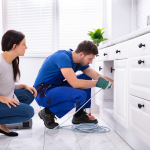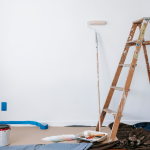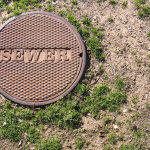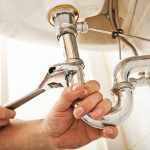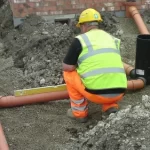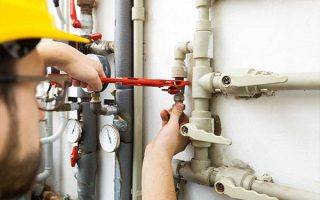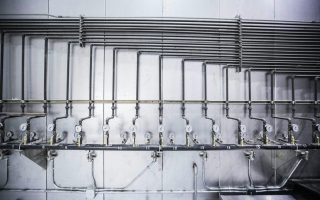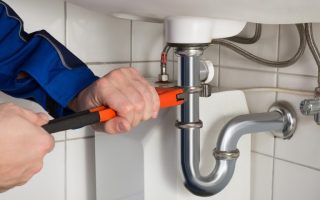Every homeowner dreads the day when they’re faced with a major, expensive repair. Some of the costliest of these emergency repairs involve water and your home’s pipes, lines, and plumbing. In this article, we review the most expensive home plumbing repair needs, as well as how you can take steps to avoid a major plumbing catastrophe in your home.
Water Leaks
All of the plumbing repairs mentioned in this article have a common theme: water being where it is not meant to be. A leak is the most common cause of this problem. Water leaks in your home can cause structural damage, lead to mold growth, and ruin your floors and walls. Once you add up the cost of repairing the original cause of the leak, mold remediation, and replacing your floors, almost any water leak has the potential to be a major expense.
Most residential water leaks are caused by frozen pipes or roof leaks:
- Burst Frozen Pipes: On below-freezing nights of the year, your pipes are vulnerable. If your home’s heater stops working, the water in some pipes could freeze. As this happens, the water expands into ice, putting incredible pressure on the otherwise-resilient PVC or metal water pipes behind your walls or beneath your floors. Then, the pipe bursts, sending water flooding out. Frozen pipes are incredibly common in cold-weather cities throughout the United States, and they are a major headache for homeowners.
- Roof Leaks: Many roof issues are small and seemingly innocuous at the start. However, as the underlayment deteriorates and moisture gets to the roof structure, a leak is only a matter of time. Roof leaks can lead to significant water damage throughout the home. At that point, not only will the roof need to be repaired, but you’ll also need to deal with the water damage and any effects it has caused.
Here’s how you can avoid water damage and leaks from these two common scenarios:
- Schedule annual maintenance for your home’s furnace to ensure it’s in good working condition heading into the winter. If your home does have outdoor pipes or water lines in exterior walls, have a plumber wrap them in insulation to prevent freezing. If you’re traveling during the winter, ask a neighbor, family member, or friend to periodically check in to ensure that your heater is still running, especially at night. If your pipes do freeze, have a plumber thaw them—never try to do this work yourself!
- Be proactive when it comes to addressing roofing issues. Have a professional roofer inspect your roof every year, especially before rain or snow arrives. If the roofer does identify issues, such as missing shingles, have them fix them as soon as possible. In the event a leak is discovered, call a roofer and mold specialist immediately for an assessment of the damage. A roof leak, as you might expect, will not fix itself.
Sewer Line Issues
Your sewer line is an important part of everyday life in your home. It carries wastewater away from your kitchen and bathrooms to the municipal sewer. When sewer lines encounter problems, making repairs can be incredibly costly. Here are some of the common issues sewer lines face:
- Tree Root Incursion: Any nearby trees in your yard will be drawn to even a relatively small leak in the sewer line. Given enough time, their root systems will grow around and into the line, either blocking it or causing a significant leak in your yard. Fixing this issue typically requires removing the offending tree and digging up the line for repairs, which can quickly add up to an expensive project.
- Clogs: Kitchen and bathroom waste has the potential to form a clog deep in the line. Putting grease, oils, coffee grounds, eggshells, or flour down your kitchen sink can lead to a clog, as can flushing inorganic materials—including allegedly “flushable” wipes—down the toilet. When a clog forms, the wastewater has nowhere to go except back up into your home. The resulting mess can cost tens of thousands of dollars to address.
The good news is that you can take steps to actively avoid most sewer line issues:
- Form a ten-foot perimeter around your sewer line and move any nearby trees to other parts of your yard. Talk to your plumber about which trees and bushes have fast-growing roots that may quickly reach the line. In some cases, tree species with slow-growing root systems may not pose the same threat as others.
- Avoid putting inappropriate kitchen or bathroom waste down the sink or the toilet. Instead, dispose of grease and oils in glass jars before tossing them into the trash. If you suspect a clog is forming in the sewer line, stop running water immediately and call a plumber out to inspect the line. Plumbing professionals have endoscopic camera tools that allow them to look into the sewer line and see a partially formed clog. From there, they can remove it.
Avoid compounding your plumbing problems
Whether it involves thawing a frozen pipe, replacing a water heater, or moving a pipe, many homeowners make matters worse—and more costly—by trying to tackle the work themselves, despite not having the right experience, training, or tools to do so. When in doubt, always call a plumbing professional. The stakes are just too high. The upfront cost of hiring an expert is worth the decreased risk of you making the problem far, far worse.


